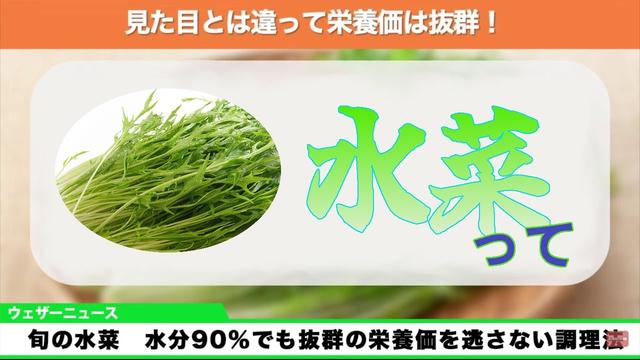Seasonal water vegetables A cooking method that does not miss the outstanding nutritional value even with 90% water
Provided by: Weathernews
It's still cold and the hot pot is delicious. There may be many people who put seasonal water vegetables in a pot now. At first glance, Mizuna seems to be thin, but it is actually an excellent vegetable in terms of nutrition. I asked Mr. Satomi Shibata, a registered dietitian, for a detailed story.

Mizuna, which originated in Kyoto, a national district
Mizuna, also known as "Kyosai," is said to be one of the traditional Japanese Kyoto vegetables that have been cultivated in Kyoto since the early Edo period. "It is said that the origin of the name of Mizuna is that it was cultivated only with water and soil without fertilizer, and because it has plenty of water. Nowadays, house cultivation is popular and it is sold all year round. In Kyoto, it is said that "when the water vegetables start to line up, it's winter production", and you look forward to the pot containing the water vegetables. When you put the water vegetables in the pot, you can smell the fish and meat. It will erase it, so it's perfect for hot pot dishes of this time. "(Mr. Shibata)
The nutritional value is outstanding unlike the appearance
Although the crunchy texture of Mizuna is good, the stems and leaves are thin, and it feels a little unreliable compared to Komatsuna and spinach, but what about nutrition? "It's certainly more than 90% water, but it's a surprisingly nutritious vegetable. For example, it contains 55mg of vitamin C per 100g, which has antioxidant properties, skin-beautifying effects and immunity-enhancing effects, which is lemon. It is more than half the amount. Also, potassium, which has the effect of promoting bone formation and eliminating excess sodium in the body to suppress the rise in blood pressure, is comparable to the content of lemon, which is one of the highest in vegetables. In addition, it contains 210 mg of calcium per 100 g, which is about twice as much as milk, and it is extremely high in vegetables. It is rich in dietary fiber and β-carotene, so the nutritional value is balanced. It can be said that it is an excellent green-yellow vegetable. "(Mr. Shibata)
Excellent compatibility with oil, even soup in a pot
How do you cook to keep up with these excellent nutrients? "Vitamin C in Mizuna is water-soluble, so it will flow out when boiled. Therefore, if you want to make a hot pot, add rice or udon at the end and eat it with the soup in which vitamin C has melted. Also, if you eat raw food, you will not miss vitamin C, so salad is recommended for raw food. Beta carotene can be taken efficiently when combined with oil, so you can quickly stir it in oil, or sprinkle olive oil or sesame oil on raw food. To get abundant calcium efficiently, try to combine fish and mushrooms such as shirasu and salmon that contain vitamin D, which has the effect of facilitating the absorption of calcium. "(Mr. Shibata) Mizuna At this time of year, open-air cultivated plants with strong flavor and strong flavor are lined up in stores. If you find something with solid stems, a sense of volume throughout, and a dark green color, it may be an open-air cultivation. Eat plenty of delicious water vegetables and survive the cold season.
Weathernews
Last updated: Weathernews